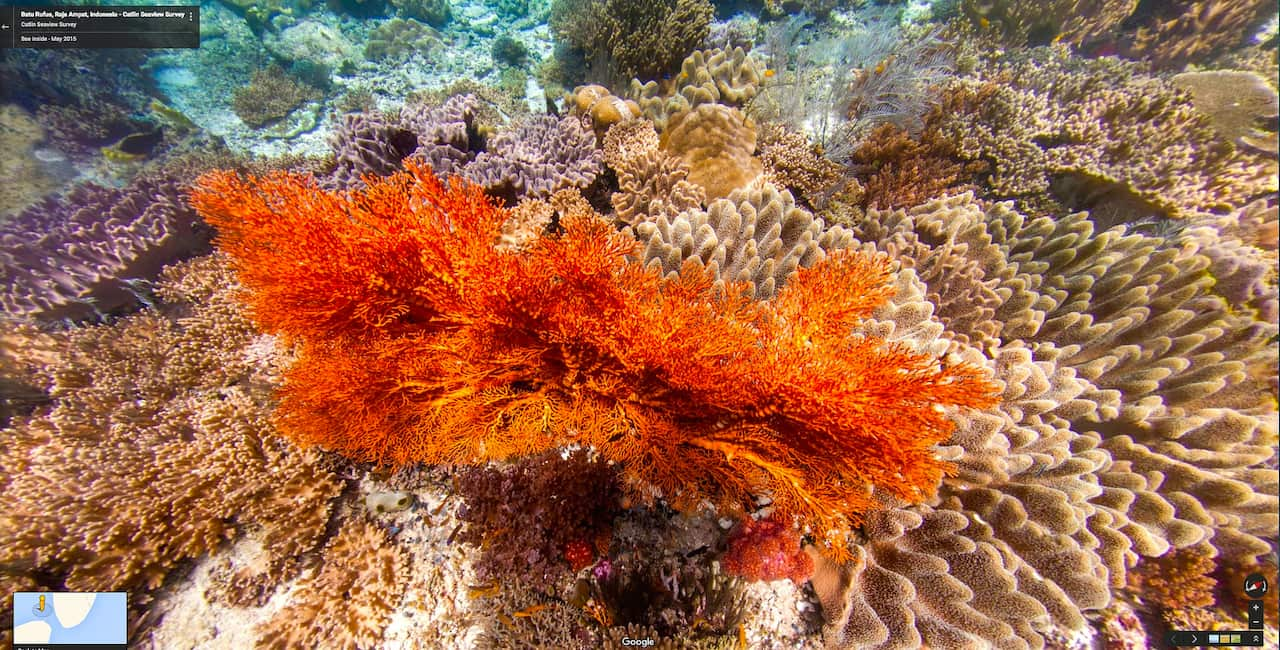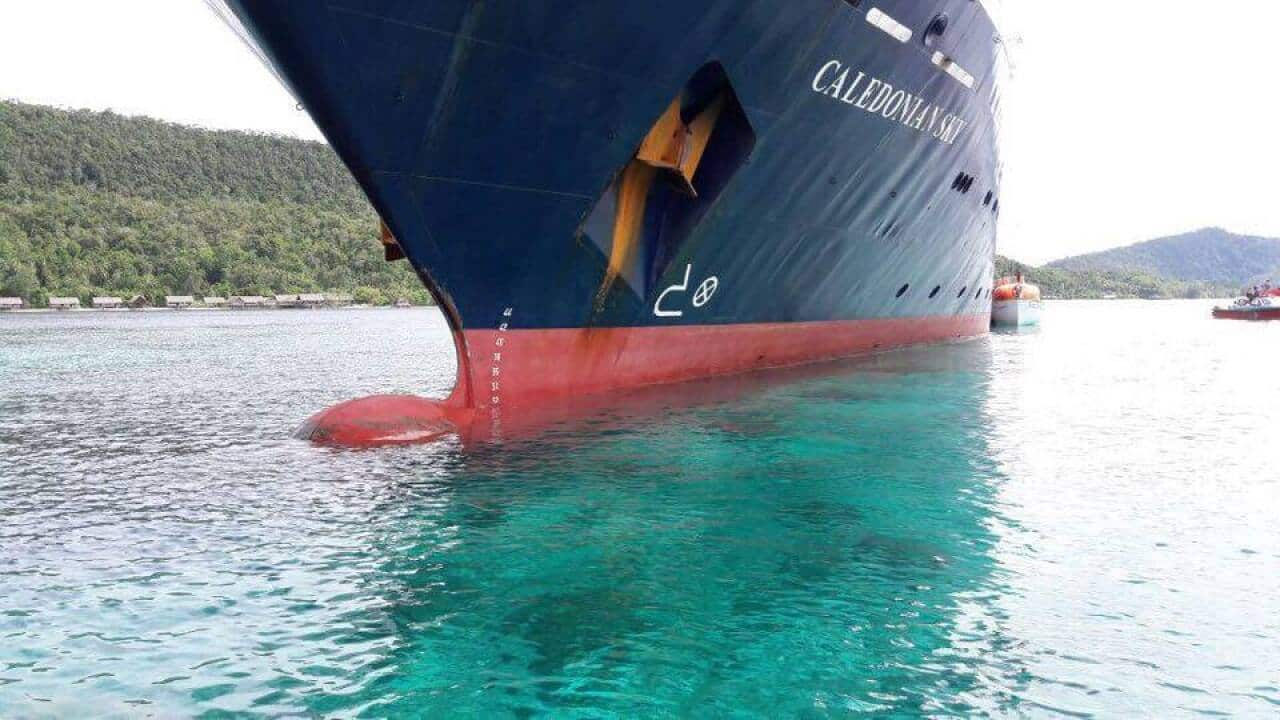Indonesia says it wants to take action after Captain Keith Michael Taylor smashed the Caledonian Sky cruise ship into a pristine coral reef then dragged across it at Raja Ampat in Indonesia's West Papua province last week.
Conservation International Indonesia, Papua University and West Papua's Regional Technical Implementing Unit said their of the damage caused by the ship, run by UK-tour operator Noble Caledonia, spread across 14,000 square metres.
In a statement this week, the Indonesian Maritime Affairs Ministry spokesperson said the destruction to the largely untouched Raja Ampat - known to be the most biodiverse in the world, according WWF - was "impossible to repair".
On March 4, the Caledonian Sky cruise ship carrying 102 tourists ran aground on coral reef surrounding Raja Ampat archipelago, comprising around 1,000 islands, northwest of Indonesia's West Papua province.
Captain Taylor manoeuvred the ship back to deeper waters using GPS but did not consider the low tide, according to the Maritime Affairs Ministry.
The ministry spokesperson said that "coral reefs which have been growing for hundreds of years were marred by the captain of MV Caledonian Sky in less than a day".
"Worse, the coral reefs damaged by the captain of Caledonian Sky was located right in the heart of Raja Ampat, the centre of marine biodiversity."
They added it was "impossible to repair parts of the reefs that have been damaged or destroyed". Maritime Affairs Minister Luhut Binsar Pandjaitan told media at the Presidential Palace in Jakarta on Tuesday that the government this week commenced a joint task force, including his ministry, the Environment and Forestry Ministry, the Transportation Ministry, the Attorney General and the National Police, to investigate the incident.
Maritime Affairs Minister Luhut Binsar Pandjaitan told media at the Presidential Palace in Jakarta on Tuesday that the government this week commenced a joint task force, including his ministry, the Environment and Forestry Ministry, the Transportation Ministry, the Attorney General and the National Police, to investigate the incident.

Coral and marine life at Raja Ampat, or Four Kings, in Indonesia. Photo: Ratha Grimes/Creative Commons. Source: Ratha Grimes
The task force will assess the environmental damage, and whether the captain and Noble Caledonia breached Indonesian laws.
The Maritime Ministry spokesperson said while Noble Caledonia's insurance companies said they would pay for the damage to the environment, "that does not eliminate the criminal aspect of the case".
Under Indonesia's 2009 Environment and Protection Management Law, damaging natural resources, such as coral reefs, is an offence that carries the possibility of imprisonment.
The Transportation Ministry is determining whether the ship had permission to enter shallow waters and whether the ship was equipped to measure water depth.
Conservation International Indonesia program manager Albert Nebore said, by Indonesia's daily The Jakarta Post, the cruise ship reportedly entered the area without consulting local guides.
"The skipper forced the ship to enter the area, which was not open to cruise ships," he said. In a statement provide to SBS, a Noble Caledonia spokesperson apologised.
In a statement provide to SBS, a Noble Caledonia spokesperson apologised.

Raja Ampat is known for its majestic natural surrounds. Photo: Max Mossler/Creative Commons Source: Max Mossler/Creative Commons
"As a company we are very upset that this incident has led to the damage to this reef.
"We value our relationships around the world with local people and we are sorry to have impacted the local community," they said.
"To this end, Noble Caledonia has established a fund with the aim of helping the local population and contributing to the repair of the reef. We would like to send our own expedition teams to help with the regeneration."
The spokesperson said that the ship grounded just after high water at 12.41pm on March 4. A decision was made to try and refloat her on the next high water at 10.30pm.
An Indonesian Search and Rescue Authority suggested to use a tugboat to help move her with the incoming tide at 9.20pm, and the local harbour master agreed, according to the spokesperson.
However, this attempt to refloat the ship failed, they added.
"We immediately recognised that our actions caused this incident. We now need to establish precisely how we can assist local operators and authorities to finance and work towards a regeneration of this vital reef."
They added that Noble Caledonia was confident in the captain commanding the ship who they said had been navigating the Asia-Pacific waters for more than 20 years.
'No-go zone for at least five years'
Conservation International told SBS the best way to restore Raja Ampat where there are largely abundant healthy reefs surrounding the grounding site was through natural regeneration.
Dr Mark Erdmann, a coral reef ecologist and vice president of Conservation International's Asia-Pacific Marine Programs said it would take several hundred years to return to its former state.
"Under the best conditions, such an area of damage will take a decade or more to return to a similar percentage of live coral cover, and could easily take several centuries to return to its former state given that a number of the large boulder coral colonies destroyed by the grounding are between 200 and 400 years old," said Dr Erdmann, who has worked in Raja Ampat for about 15 years.
"We will recommend that the grounding site be designated a strict no-go zone for at least the next five years, to prevent any further stress from fishing or tourism activities and allow maximum recovery potential."

Coral at Raja Ampat. Photo: Kevin Dooley/Creative Commons Source: Kevin Dooley/Creative Commons
Cost of the damage
Authorities estimated the value of the coral reef there to be worth between US$817 and $1,296 per square meter.
But Dr Erdmann said it could be much more.
By comparison, the Northern Marianas Commonwealth house bill calculates $3000 per square meter ship for groundings on coral reefs in the Commonwealth, Dr Erdmann explained.
If there are aggravating circumstances, such as a cruise ship moving through a reef area where it shouldn't be, another $1000 per square meter is added.
An additional $1000 per square meter fine may be imposed if an accident occurs in a marine park, such as Raja Ampat's Dampier Strait, and yet another $1000 per square meter if it occurs on threatened coral species.
"In this case, the Caledonia Sky would be fined $6000 per square meter if this accident had happened in the Northern Marianas," Dr Erdmann said.

A fish swims through coral in Raja Ampat's waters. Photo: Ratha Grimes/Creative Commons Source: Ratha Grimes/Creative Commons

